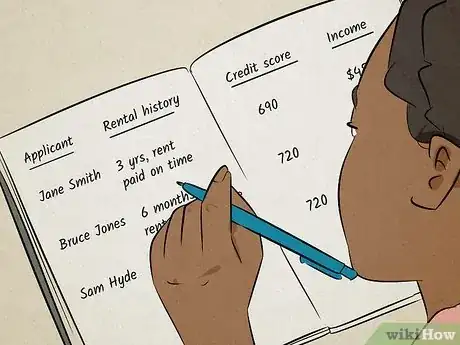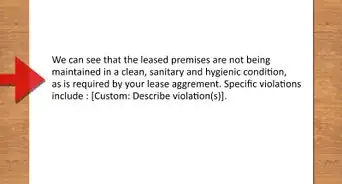This article was co-authored by wikiHow staff writer, Eric McClure. Eric McClure is an editing fellow at wikiHow where he has been editing, researching, and creating content since 2019. A former educator and poet, his work has appeared in Carcinogenic Poetry, Shot Glass Journal, Prairie Margins, and The Rusty Nail. His digital chapbook, The Internet, was also published in TL;DR Magazine. He was the winner of the Paul Carroll award for outstanding achievement in creative writing in 2014, and he was a featured reader at the Poetry Foundation’s Open Door Reading Series in 2015. Eric holds a BA in English from the University of Illinois at Chicago, and an MEd in secondary education from DePaul University.
There are 13 references cited in this article, which can be found at the bottom of the page.
Learn more...
If you’re renting out a residential unit in a high-demand area, you could end up with all kinds of offers and applications pouring in for the unit. But how do you pick one applicant over another? Can you auction the unit off to the highest bidder? If you’re new to renting units, all of this can seem like a lot. But we’re here to help you make sense of this so that you can make the best decisions for you. In this article, we’ll break down everything you’d need to know about juggling multiple offers.
Things You Should Know
- Most landlords either use a first come, first served policy, or choose tenants based on the quality of their overall application.
- Look up your local state and city laws to ensure you’re using a fair and legal process to select tenants.
- So long as it’s legal, you are allowed to ask all applicants to submit a “best offer” on what they’d pay for rent.
- Use the same application and rental process for all of the applicants to avoid accidentally displaying bias.
Steps
References
- ↑ https://www.nolo.com/legal-encyclopedia/free-books/renters-rights-book/chapter1-2.html
- ↑ https://www.nolo.com/legal-encyclopedia/free-books/renters-rights-book/chapter1-2.html
- ↑ https://www.fairtrading.nsw.gov.au/resource-library/housing-and-property/rent-bidding-general-fact-sheet
- ↑ https://www.realestate.com.au/advice/what-is-rental-bidding/
- ↑ https://www.hud.gov/program_offices/fair_housing_equal_opp/fair_housing_act_overview
- ↑ https://www.allpropertymanagement.com/resources/ask-a-pro/posts/property-managers-choose-applicants/
- ↑ https://ag.ny.gov/sites/default/files/tenants_rights.pdf
- ↑ https://www.mynd.co/knowledge-center/to-avoid-the-nightmare-tenant-set-up-a-consistent-screening-process
- ↑ https://www.apartmentlist.com/renter-life/forms-needed-to-rent-an-apartment
- ↑ https://www.tenantcube.com/blog/how-to-politely-turn-down-a-tenant
- ↑ https://www.consumer.ftc.gov/sites/default/files/articles/pdf/pdf-0111-fair-credit-reporting-act.pdf
- ↑ https://www.nolo.com/legal-encyclopedia/free-books/renters-rights-book/chapter1-2.html
- ↑ https://www.avail.co/education/guides/complete-guide-to-tenant-screening/how-to-accept-or-deny-prospective-tenants
- ↑ https://www.michbar.org/file/programs/cii/pdfs/housing_rights.pdf
- ↑ https://www.nolo.com/legal-encyclopedia/how-screen-select-tenants-faq.html
- ↑ https://www.avail.co/education/guides/complete-guide-to-tenant-screening/how-to-accept-or-deny-prospective-tenants





































































